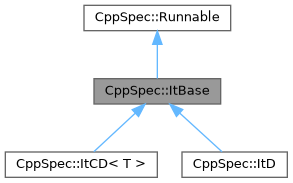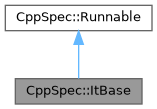Base class for it expressions.
More...
#include <it_base.hpp>


Public Member Functions | |
| ItBase (std::source_location location) noexcept | |
| Create an BaseIt without an explicit description. | |
| ItBase (std::source_location location, const char *description) noexcept | |
| Create an BaseIt with an explicit description. | |
| bool | needs_description () noexcept |
| Get whether the object needs a description string. | |
| std::string | get_description () const noexcept |
Get the description string for the it statement. | |
| ItBase & | set_description (std::string_view description) noexcept |
| Set the description string. | |
| template<Util::is_not_functional T> | |
| ExpectationValue< T > | expect (T value, std::source_location location=std::source_location::current()) |
The expect object generator for objects and LiteralTypes. | |
| template<Util::is_functional T> | |
| ExpectationFunc< T > | expect (T block, std::source_location location=std::source_location::current()) |
The expect object generator for lambdas. | |
| template<typename T> | |
| ExpectationValue< std::initializer_list< T > > | expect (std::initializer_list< T > init_list, std::source_location location=std::source_location::current()) |
The expect object generator for initializer lists. | |
| template<typename T> | |
| ExpectationValue< T > | expect (Let< T > &let, std::source_location location=std::source_location::current()) |
The expect object generator for Let. | |
| ExpectationValue< std::string > | expect (const char *string, std::source_location location=std::source_location::current()) |
The expect object generator for const char*. | |
| void | add_result (const Result &result) |
| std::list< Result > & | get_results () noexcept |
| const std::list< Result > & | get_results () const noexcept |
| void | clear_results () noexcept |
| Result | get_result () const override |
 Public Member Functions inherited from CppSpec::Runnable Public Member Functions inherited from CppSpec::Runnable | |
| Runnable (std::source_location location) | |
| bool | has_parent () noexcept |
| Check to see if the Runnable has a parent. | |
| bool | has_parent () const noexcept |
| Runnable * | get_parent () noexcept |
| Get the Runnable's parent. | |
| const Runnable * | get_parent () const noexcept |
| std::list< std::shared_ptr< Runnable > > & | get_children () noexcept |
| const std::list< std::shared_ptr< Runnable > > & | get_children () const noexcept |
| template<class C> | |
| C * | get_parent_as () noexcept |
| template<class C> | |
| const C * | get_parent_as () const noexcept |
| template<typename T, typename... Args> | |
| T * | make_child (Args &&... args) |
| std::string | padding () const noexcept |
| Generate padding (indentation) fore the current object. | |
| std::source_location | get_location () const noexcept |
| void | set_location (std::source_location location) noexcept |
| virtual void | run ()=0 |
| virtual void | timed_run () |
| std::chrono::duration< double > | get_runtime () const |
| std::chrono::time_point< std::chrono::system_clock > | get_start_time () const |
| size_t | num_tests () const noexcept |
| size_t | num_failures () const noexcept |
Detailed Description
Base class for it expressions.
This class is needed to prevent a circular dependency between it.hpp and basematcher.hpp. Matchers need to know whether or not an it has an explicit description string or whether the description should be generated. its need to be able to refer to Expectations, and Expectations need to know about Matchers and execute them. This class is the least common denominator of the it classes, and thus is used to resolve the dependency cycle.
Constructor & Destructor Documentation
◆ ItBase() [1/2]
|
inlineexplicitnoexcept |
Create an BaseIt without an explicit description.
- Returns
- the constructed BaseIt
◆ ItBase() [2/2]
|
inlineexplicitnoexcept |
Create an BaseIt with an explicit description.
- Parameters
-
description the documentation string of the itstatement
- Returns
- the constructed BaseIt
Member Function Documentation
◆ expect() [1/5]
|
inline |
The expect object generator for const char*.
- Parameters
-
string the string to wrap
- Returns
- a ExpectationValue object containing a C++ string
◆ expect() [2/5]
| ExpectationValue< T > CppSpec::ItBase::expect | ( | Let< T > & | let, |
| std::source_location | location = std::source_location::current() ) |
The expect object generator for Let.
- Parameters
-
block the let variable
- Template Parameters
-
T the type of the value contained in the ExpectationFunc
- Returns
- a ExpectationValue object containing the given value.
◆ expect() [3/5]
| ExpectationValue< std::initializer_list< T > > CppSpec::ItBase::expect | ( | std::initializer_list< T > | init_list, |
| std::source_location | location = std::source_location::current() ) |
The expect object generator for initializer lists.
An expect for initializer_list subjects.
- Parameters
-
init_list the list to wrap
- Template Parameters
-
T the type of the items inside the initializer list
- Returns
- a ExpectationValue object containing the given init_list.
◆ expect() [4/5]
| ExpectationFunc< T > CppSpec::ItBase::expect | ( | T | block, |
| std::source_location | location = std::source_location::current() ) |
The expect object generator for lambdas.
- Parameters
-
block the lambda to wrap.
- Template Parameters
-
T the type of the lambda/function contained in the ExpectationFunc
- Returns
- a ExpectationFunc object containing the given value.
◆ expect() [5/5]
| ExpectationValue< T > CppSpec::ItBase::expect | ( | T | value, |
| std::source_location | location = std::source_location::current() ) |
The expect object generator for objects and LiteralTypes.
A simple expect statement.
- Parameters
-
value the item to wrap. This parameter is passed by value so that statements like expect(2)orexpect(SomeClass())can be passed in
- Template Parameters
-
T the type of the object contained in the ExpectationValue
- Returns
- a ExpectationValue object containing the given value.
◆ get_description()
|
inlinenodiscardnoexcept |
Get the description string for the it statement.
- Returns
- the description string
◆ get_result()
|
inlinenodiscardoverridevirtual |
Reimplemented from CppSpec::Runnable.
◆ needs_description()
|
inlinenoexcept |
Get whether the object needs a description string.
- Returns
- whether this object needs a description to be generated or not
◆ set_description()
|
inlinenoexcept |
Set the description string.
- Returns
- a reference to the modified ItBase
The documentation for this class was generated from the following files:
- include/it_base.hpp
- include/it.hpp